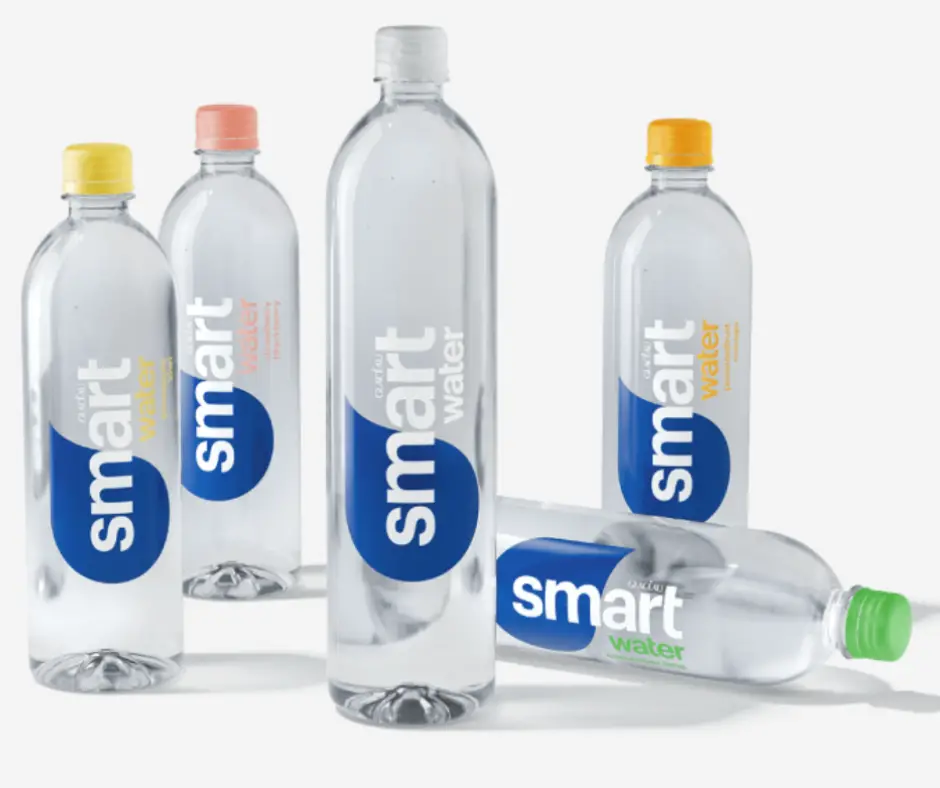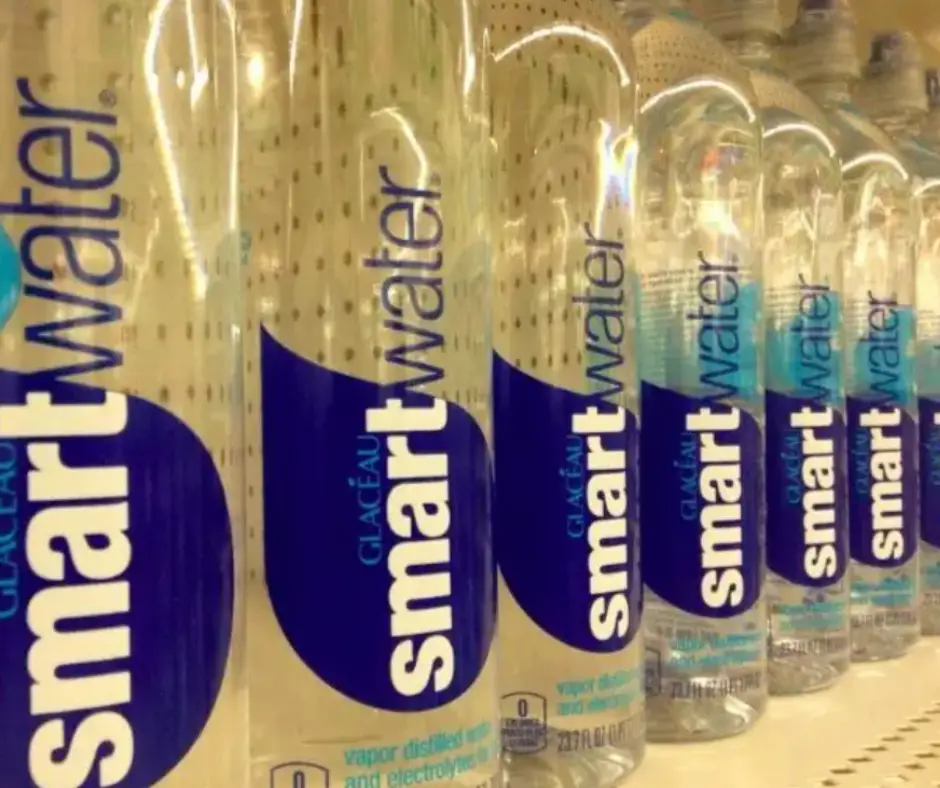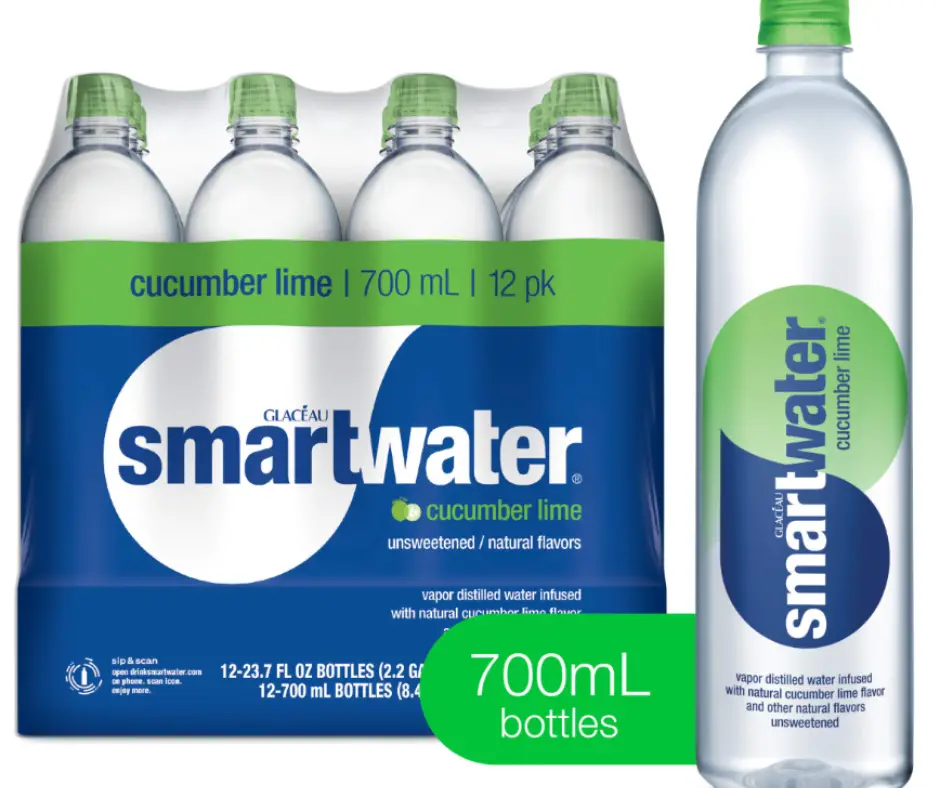Water is essential for our overall health and well-being. It is crucial to regulate body temperature, lubricate joints, deliver nutrients to cells, and keep organs functioning optimally. Staying well-hydrated is vital, and various types of water in the market claim to offer additional benefits beyond hydration. One such product is Smart Water. But Is Smart Water Good For You? This blog will help you answer this question.
What Is Smart Water?

Smart Water is a brand of water distilled by vapor and contains added electrolytes such as potassium and magnesium chloride. It is marketed as a superior hydration aid that can enhance your body’s processes through the added benefits of the included vitamins and electrolytes.
Claims And Benefits Of Smart Water
So, Is Smart Water Good For You? Smart Water’s claim to fame is its ability to provide superior hydration to regular water. The added electrolytes help replenish the body’s electrolyte balance, especially during extreme dehydration or high activity levels. Some potential benefits of Smart Water include:
- Enhanced hydration: The added electrolytes in Smart Water may help improve hydration levels, particularly during intense physical activity or in hot environments.
- Electrolyte balance: Electrolytes are crucial in maintaining fluid balance, nerve function, and muscle contractions. Smart Water aims to replenish these essential minerals.
- Improved performance: Smart Water claims that the added electrolytes and minerals can improve physical performance by promoting hydration and electrolyte balance.
Importance Of Hydration
Proper hydration is essential for overall health, and it is recommended that the average woman drinks roughly 11 cups of water per day, while men should aim for around 16 cups. While not all of this water needs to come from plain water, avoiding beverages that harm our health, such as sugary sodas and fruit juices is crucial.
Water is a vital component of our daily fluid intake, and it is best to prioritize drinking plain water and consuming a balanced diet that provides the necessary vitamins and minerals. Enhanced or smart waters may offer additional benefits in specific cases but are not essential for everyday hydration.
It’s important to note that Smart Water is essentially filtered tap water with added electrolytes and minerals, so alternatives such as tap water with added vitamins or minerals can also be considered. Additionally, purchasing a faucet filter to remove contaminants and using individual serving-sized packets of vitamins or electrolytes can be cost-effective alternatives to bottled smart water.
In conclusion, while Smart Water may offer potential benefits in certain scenarios, the most crucial aspect of hydration is to keep your body well-hydrated and consume a nutritious diet. Regular water and a balanced diet can provide the necessary vitamins and minerals to support your body’s processes.
Ingredients And Nutrition
When answering, is smart water good for you? It’s important to understand its ingredients and nutrition profile. Let’s take a closer look:
Electrolytes In Smart Water
Smart Water contains electrolytes, minerals that help maintain proper fluid balance. The electrolytes found in Smart Water include:
- Calcium Chloride
- Magnesium Chloride
- Potassium Bicarbonate
These electrolytes are added to enhance the flavor of the water rather than act as a significant source of electrolyte replacement, like sports drinks such as Gatorade. You can learn more about the benefits of electrolytes on Wikipedia.
Added Vitamins And Minerals
In addition to electrolytes, Smart Water often includes added vitamins and minerals. However, it’s important to note that these vitamins and minerals are typically minimal and may not significantly contribute to your overall nutrient intake. Some of the added vitamins and minerals found in Smart Water may include:
- Vitamin B3 (Niacin)
- Vitamin B6
- Vitamin B12
While these added vitamins and minerals may sound beneficial, it’s important to remember that our bodies are more efficient at obtaining the nutrients they need from whole foods.

Comparison To Regular Water
Regarding hydration, regular water is usually sufficient for most individuals. Smart Water may offer some slight benefits in terms of taste due to the added electrolytes. Still, it may not provide any significant advantages over regular water regarding hydration. Staying hydrated by drinking adequate water throughout the day is always a good idea.
In conclusion, while Smart Water may have added electrolytes and vitamins, it may not offer substantial benefits compared to regular water for most individuals. Drinking adequate water and obtaining nutrients from whole foods is generally the best way to stay hydrated and nourished.
Health Benefits
When it comes to the health benefits of Smart Water, there are a few factors to consider. Let’s delve into some of the potential advantages of incorporating Smart Water into your hydration routine:
Hydration And Electrolyte Balance
One of the key selling points of Smart Water is its electrolyte content. Electrolytes, such as sodium, calcium, and potassium, play a crucial role in maintaining proper hydration and fluid balance. These minerals are essential for various bodily functions, including nerve signalling, muscle contractions, and fluid regulation.
Replenishing electrolytes through Smart Water may help maintain optimal hydration levels, especially during intense physical activity or in hot weather conditions. The added electrolytes in Smart Water can aid in restoring electrolyte balance and preventing dehydration.
Potential Improvements In Performance And Recovery
Adequate hydration is vital for optimal athletic performance and post-exercise recovery. The electrolytes in Smart Water can assist in replenishing the minerals lost through sweat during physical exertion. This can contribute to improved performance, endurance, and reduced muscle cramping.
Furthermore, Smart Water’s higher pH level than regular tap water may help neutralize acidity in the body. By promoting a more balanced pH, it may support overall physical performance and recovery.
Impact On Overall Health And Well-being
Staying properly hydrated is essential for overall health and well-being. Drinking adequate water helps regulate body temperature, aids digestion, promotes cardiovascular health, and supports cognitive function.
With its added electrolytes and potential hydration benefits, Smart Water could be a suitable beverage choice for a well-rounded approach to maintaining good health.
It is worth noting that while Smart Water may have its advantages, it is important to remember that individual hydration needs may vary. Consulting with a healthcare professional or registered dietitian for personalized advice on meeting your specific hydration requirements is recommended.
Smart Water can be a valuable addition to your daily routine with the potential benefits of electrolyte replenishment and improved hydration. As always, it is crucial to prioritize a balanced diet, regular exercise, and overall healthy lifestyle habits to optimize your well-being.
Disclaimer: This article is for informational purposes only and should not be considered medical advice. Always consult with a healthcare professional before changing your diet or hydration routine.

Safety And Side Effects
Is Smart Water Safe To Consume?
Smart Water is generally considered safe to consume as it is just water with added electrolytes. The added electrolytes, such as potassium and calcium, are essential minerals necessary for normal functioning. However, it is always recommended to check the ingredient list and consult a healthcare professional if you have any specific concerns or pre-existing medical conditions.
Potential Side Effects Of Consuming Smart Water
While Smart Water is generally safe for consumption, there are a few potential side effects to be aware of:
- Electrolyte Imbalance: Consuming excessive amounts of Smart Water, especially if it is the sole source of hydration, can lead to electrolyte imbalances. Maintaining a balanced diet and hydrating with various fluids is important to ensure adequate electrolyte intake.
- Kidney Function: Individuals with impaired kidney function or other kidney-related conditions should consult a healthcare professional before consuming Smart Water or any other beverage with added electrolytes.
- Sodium Intake: Smart Water contains added sodium, which may concern individuals following a low-sodium diet or those with certain health conditions, such as hypertension. It is important to monitor sodium intake and consider alternatives if necessary.
Recommendations For Usage
To ensure safe and optimal usage of Smart Water, consider the following recommendations:
- Moderation: Use Smart Water as part of a well-balanced diet and hydration routine rather than relying solely on it for all your hydration needs.
- Individual Needs: Tailor your fluid intake to your needs and consult a healthcare professional if you have any specific requirements or conditions.
- Dietary Variety: Incorporate a variety of fluids and foods to meet your hydration and electrolyte needs. This can include water, fruits, vegetables, and other sources of electrolytes.
- Hydration With Exercise: Electrolyte replacement may be beneficial if you engage in intense physical activity or exercise. Smart Water can be one option to help replenish electrolytes lost through sweat.
It is essential to listen to your body’s signals and seek professional advice if you have concerns about consuming Smart Water or any other beverage with added electrolytes.
Alternatives To Smart Water
If you’re looking for alternatives to Smart Water, several other options can provide you with hydration and potential health benefits. Here are a few alternatives worth considering:
Flavored Water Options
Flavored water is a popular alternative to regular water, as it adds flavor without the added sugar or calories found in soda or juice. These beverages are often infused with fruit flavors and can be refreshing and hydrating. Some popular flavored water brands include:
- LaCroix
- Hint Water
- Bai Flavored Water
These flavored water options come in various flavors and are typically made with natural ingredients, making them a healthier alternative to sugary drinks.
Artesian Water
Artesian water is another alternative, as it is sourced from underground wells and often filtered to remove impurities. This type of water is known for its natural minerals and can taste refreshing. Some popular brands of artesian water include:
- Fiji Water
- Voss Water
Artesian water is often praised for its purity and mineral content, making it a popular choice among health-conscious individuals.
Coconut Water And Mineral Water
Coconut water is a hydrating beverage rich in electrolytes, making it a popular choice for athletes and those looking for a natural source of hydration. It is also low in calories and fat, making it a healthier alternative to sugary sports drinks. Some well-known brands of coconut water include:
- Vita Coco
- ZICO
Mineral water is another option, as it naturally contains minerals that can benefit health. It is often sourced from natural springs and can be a flavorful and refreshing choice. Some popular brands of mineral water include:
- Perrier
- San Pellegrino
These alternatives to Smart Water provide various options for those looking to stay hydrated with a touch of flavor or added health benefits.
It’s important to note that while these alternatives offer their unique advantages, regular tap water is still a safe and healthy option for hydration. Remember to prioritize drinking enough water throughout the day, regardless of the specific brand or type.
Pricing And Availability
Smart Waterfalls is within the range of other bottled water options regarding pricing and availability. Here is a comparison of Smart Water pricing to some popular brands:
Comparison Of Smart Water Pricing To Other Bottled Water Options
- Smart Water: Smart Water is typically priced around $1.50 to $2.00 per 1-liter bottle. However, prices may vary depending on the retailer and location.
- Dasani: Dasani, another popular bottled water brand, is priced similarly to Smart Water, ranging from $1.50 to $2.00 per 1-liter bottle.
- Fiji Water: Fiji Water is known for its premium quality and is often priced slightly higher than Smart Water and Dasani. It typically ranges from $2.50 to $3.00 per 1-liter bottle.
- Evian: Evian is another premium bottled water brand with prices ranging from $2.00 to $2.50 per 1-liter bottle.
It’s important to note that prices may vary based on factors such as location, retailer, and promotional offers. It’s always a good idea to compare prices and look for deals when purchasing bottled water.
Considerations For Cost And Accessibility
When it comes to the cost and accessibility of Smart Water, there are a few factors to consider:
- Cost: Smart Water and other bottled water options may seem more expensive than tap water, but they offer convenience and portability. If you prefer the taste or quality of bottled water and it fits within your budget, it can be a convenient option for staying hydrated on the go.
- Accessibility: Bottled water, including Smart Water, is widely available in grocery stores, convenience stores, and online retailers. It is important to note that access to clean and safe drinking water is a critical global issue. In many regions, tap water may be the most accessible and sustainable option.
It is worth considering the environmental impact of single-use plastic bottles. If sustainability is a concern for you, there are alternative options, such as reusable water bottles with built-in filters that can provide clean and safe drinking water. These options may offer a more sustainable and cost-effective long-term solution.
In conclusion, Smart Water and other bottled water brands are priced competitively and widely available. However, it is essential to consider cost, accessibility, and environmental impact when deciding on the best water option for your needs.
FAQ about Is Smart Water Good For You?
Q: Is Smart Water really good for you?
A: Smart Water can be a good choice for healthy hydration as it contains electrolytes that are beneficial for post-workout recovery and rehydration. It also does not contain added sugars, calories, or artificial sweeteners, making it a healthier option for your daily water intake.
Q: What are the benefits of Smart Water?
A: Smart Water contains electrolytes that can help replenish essential minerals lost during physical activity or dehydration. It is low in sodium and calories and does not contain added sugars or artificial sweeteners. Smart Water is a healthier alternative to sugary drinks and can help keep you hydrated without the added calories or negative health effects. It is a great choice for athletes or active individuals who need to replenish electrolytes and stay hydrated.
Q: What ingredients are in Smart Water?
A: Smart Water is made up of purified water, electrolytes (such as calcium chloride, magnesium chloride, and potassium bicarbonate), and mineral salts. Some varieties may also be infused with vitamins or antioxidants.
Q: Is Smart Water better than regular water?
A: Smart Water can provide additional benefits compared to regular water, especially during intense physical activity or when you need to replenish electrolytes. However, for normal hydration, regular water works just fine.
Q: Are there any potential side effects of drinking Smart Water?
A: No, drinking Smart Water has no potential side effects. It is generally safe for consumption. However, it is important to note that Smart Water is not necessary for hydration, and filtered tap water can be just as beneficial.
Q: Is Smart Water safe for consumption?
A: Yes, Smart Water is safe for consumption. It is purified to remove impurities and is packaged in BPA-free and recyclable bottles. However, filtered tap water can be a good alternative for a more sustainable and cost-effective option.
Q: How many Smart Waters should I drink a day?
A: The recommended daily water intake is around eight 8-ounce glasses, which is equivalent to 1.9 to 2 liters of fluid. Drinking Smart Water can count towards fulfilling your daily water consumption.
Q: How does the pricing of Smart Water compare to other bottled water options?
A: The pricing of Smart Water is competitive with other bottled water brands, usually costing around $1.29 for a 20-ounce bottle. It may be slightly higher than some other brands, but it also offers added electrolytes and mineral content.
Conclusion
Summary Of Key Points
- Smart Water is a type of enhanced water that contains minerals, electrolytes, and other beneficial components.
- While Smart Water may offer some benefits, such as improved hydration and replenishment of nutrients, regular water is sufficient for normal rehydration.
- The added vitamins and minerals in Smart Water may not be absorbed as effectively as those obtained from food sources.
- Some studies suggest that enhanced water can be helpful for specific health reasons, but the overall impact may vary depending on the individual and the types of vitamins added.
Conclusion On Whether Smart Water Is Good For You
Now you can answer Is Smart Water Good For You? Whether or not Smart Water is good for you depends on your specific hydration needs and health goals. Here are some key considerations:
- Regular water is sufficient for everyday hydration and normal rehydration and does not require the additional vitamins and minerals in Smart Water.
- If you are experiencing extreme dehydration or engaging in high-level physical activity, electrolyte water or sports drinks may be more beneficial in replenishing fluid loss.
- It’s important to read the ingredients on Smart Water labels and choose options that do not contain added sugars or calories, as these may not contribute to hydration and can even hinder performance.
- Smart Water may offer taste benefits and convenience, but its impact on overall health and hydration effectiveness may not justify the cost and environmental consequences associated with bottled water.
Recommendations For Healthy Hydration Practices
To maintain proper hydration and improve overall health, consider these alternatives to Smart Water:
- Drink an adequate amount of regular water daily.
- Add minerals or vitamins to tap water using filters and individual serving-sized packets.
- Consult with your municipal water company to understand the mineral content in your tap water and determine if additional vitamin or mineral supplementation is necessary.
- Obtain the necessary vitamins and minerals from a balanced diet that includes a variety of nutrient-rich foods.
- Limit consumption of sugary beverages and enhanced sports drinks, as they can be high in calories and may not offer significant hydration benefits.
Remember, staying hydrated is essential for overall health, but it’s equally important to maintain a balanced diet and choose healthy fluids that suit your specific needs.

James Robinson loves coffee and blogging all about coffee. His blog is full of informative posts about the best ways to enjoy coffee and the many different types of coffee out there. He also shares recipes for delicious coffee-based dishes, and his followers can always count on him to offer tips on how to improve their coffee-making skills.
